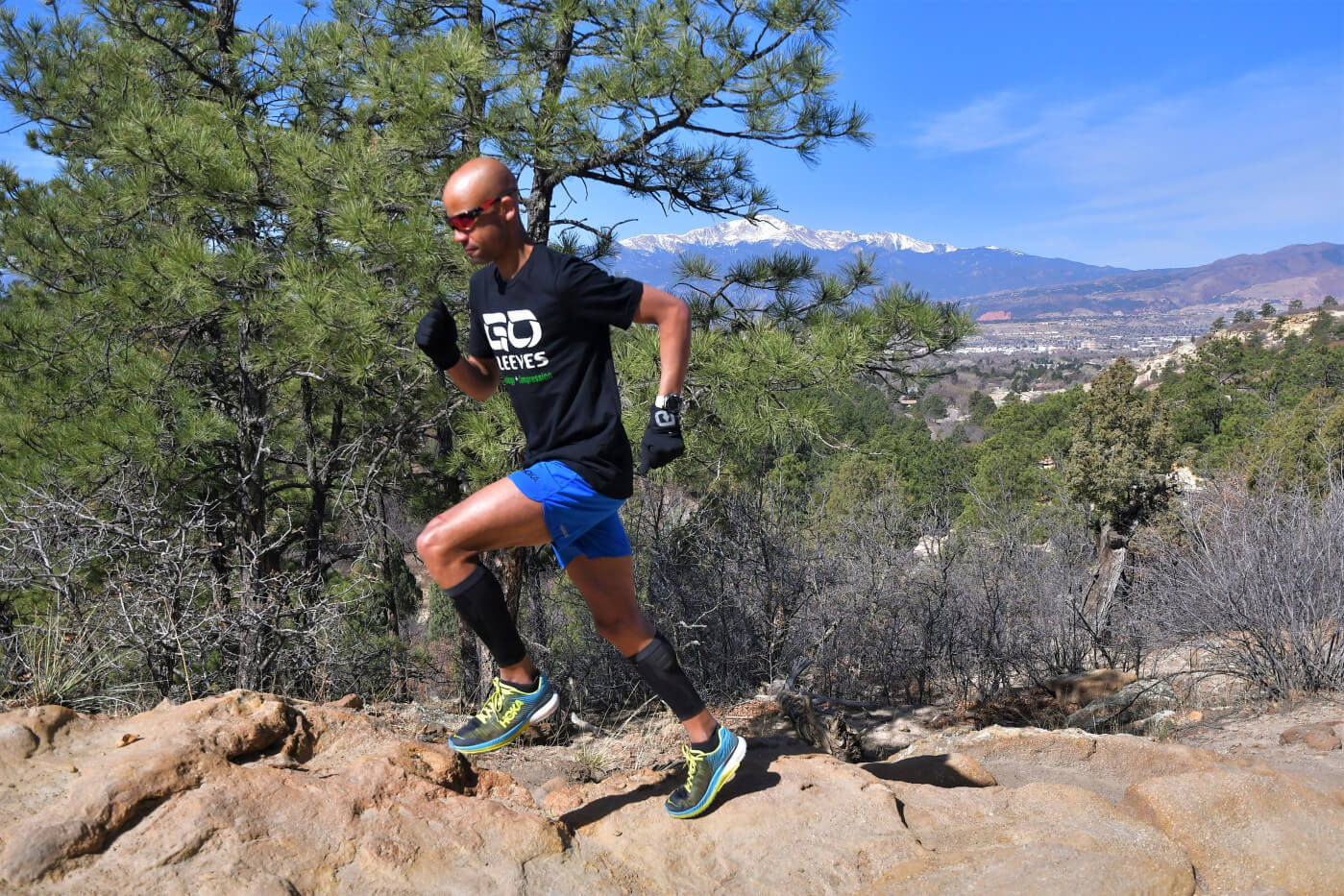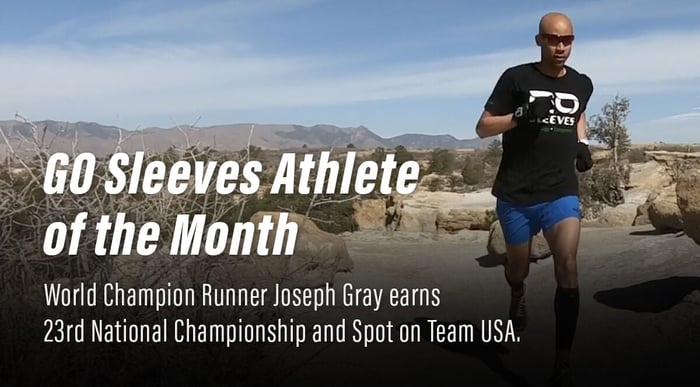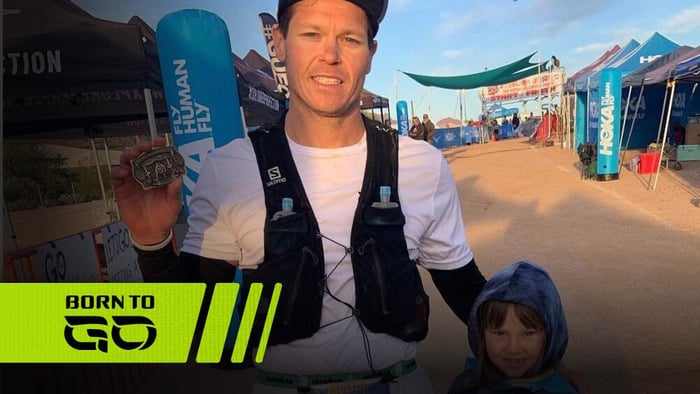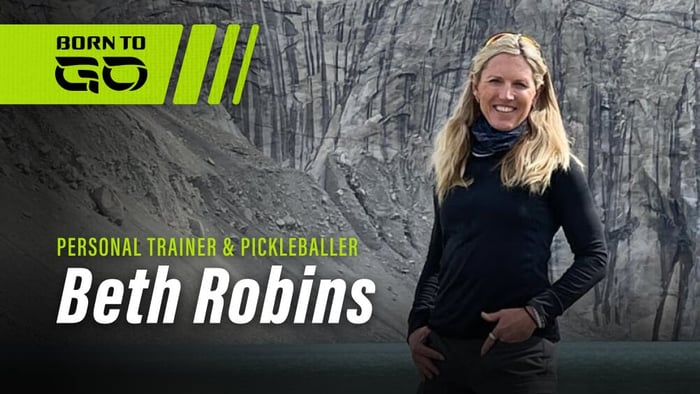World Champion Runner and GO Sleeves Athlete Joseph Gray earns 23rd National Championship and Spot on Team USA
I recently interviewed GO Sleeves Athlete and World Champion Runner Joseph Gray about his latest accomplishments. We’ve learned so much from Joseph since we started working together in 2021. He not only knows what it takes to earn US and World Running Championships – but to dominate his sport by topping the podium over and over again. In a world where taking shortcuts often tempts athletes, Joseph has earned every title clean and drug-free. We’re honored to join him on his journey of rewriting records in mountain running, testing and developing GO Sleeves, and inspiring athletes of all kinds to achieve their dreams.
During our interview, Joseph revealed three tips for taking the podium over and over again:
- Take care of your mind and body - It’s hard to stay on top. The margin of error isn’t big when the competition is solid. You have to take care of your body and your mind with regularity. There are a number of other things that can take you out of that window of being competitive at the right moment.
- Have the determination of a champion - The first time I won a world championship before I even got to the finish line, I was already thinking: “I'm gonna have to come back and win again.” Because anybody can be great, anyone can knock off one championship…The likelihood is high for a great athlete, a great person with a great mind, mental stability, mental motivation, and an excellent physical body for athletics to win a championship. Still, it’s going to be more special and more memorable if you can replicate those wins over and over again.
- Prevent injury by practicing recovery - A lot of amazing athletes fall through the cracks because of injuries. They need to think about prevention. They're not thinking about recovery. I think that's one thing that’s very special about athletes who are at the top. It could just be that they are just blessed, and their body was able to maintain itself through injuries…But there are a lot of athletes, I think, who come across the right people and the right products, at the right time in their career which allowed them extra opportunities and more time to develop. These things are very important, especially when you're a young athlete trying to develop, grow, and progress.
Read the full interview with Joseph Gray below.
Darren: Could you tell us about your recent race, when you won the vertical mountain running championship?
Joseph: It was an interesting time of the year to have a national championship. Typically, the World Championships are in the early fall. Usually, I'd have a lot more time to build up for it, but I didn't have as much time to prepare. We’d just gotten done with Worlds late last year. And so, coming into this training cycle, I was more nervous. A lot of talent was going to show up at that race.
I've been doing this for years, so I have a target on my back, and I know people are definitely gunning for me. All that added pressure was on me, but I've found that I love competing in those moments. I wanted to make Team USA again. A big goal of mine was to get another national title under my belt. It all helps to promote what I'm trying to do with Project Inspire Diversity. To motivate the next generation of young, diverse athletes, especially in the trail space. It mattered to me. So, coming into the race, I was focused on making the team and fighting for the opportunity to get another title.
Darren: How many people usually participate in a race like that?
Joseph: A national championship isn’t like a major road race where you might see 1000’s of people. It's a smaller field, mostly built of elite athletes running professionally, trying to run professionally, or they want to make a national team. And obviously, there are a lot of trail lovers and people who just do it for fun out there. It's a couple hundred runners or so, sometimes up to a thousand. It’s not like some of the big global or national marathons and road races where you have 50,000 people. A lot of mountain and trail races have permits and things like that. So their size is limited to whatever the permit will allow.
Darren: How many US national championships is this now?
Joseph: It is 23 national championships, including 2-time World Mountain Running Championships, 6-time Xterra World Running Championships, and 36-time USA National Team Member.
Darren: This season is off to a terrific start after a challenging 2022. Can you tell us more about how it’s going?
Joseph: I got COVID last year, right before a major race, and Worlds was right after that. I felt like I needed to get on the right page mentally and physically. In the past, when workouts weren’t going well, I’d either think I was overtraining, or my body wasn't responding to workouts. These days, with COVID around, when you’re a mentally strong athlete like myself, you can only do so much, and you don’t want to push too hard. You don’t want to get scar tissue and stuff in your lungs. So I went to Worlds feeling a way I’ve never felt or experienced at such a major event. It ate at my confidence and my identity. The things that make a person a great athlete weren’t there because I couldn’t prepare. I love those big championships, those big moments, and COVID kind of stripped me of the mental acumen I'm used to. It was a tough experience, mentally.
It’s hard to stay on top. The margin of error isn’t big when the competition is solid. You have to take care of your body and your mind with regularity. There are a number of other things that can take you out of that window of being competitive at the right moment.

Darren: One of the most remarkable things being around you and seeing your history of staying in that zone. What do you attribute that to? How have you been able to be an elite competitor over such a long period of time?
Joseph: Sometimes, I don't celebrate or focus too much on the most recent victory or the most recent accomplishment. I'm always thinking about the next thing and challenging myself. And I'm my biggest critic. The first time I won a world championship before I even got to the finish line, I was already thinking: “I'm gonna have to come back and win again.” Because anybody can be great, anyone can knock off one championship, but here’s how I grew up:
My dad and I used to play basketball. That was my first sport. My dad would never let me win. He said, “If you’re gonna beat me, you’ll have to earn it.” I finally beat him one time, and I'm celebrating like I won the freakin’ Super Bowl. But my dad said, “Anybody can win once. Let’s play again.” Then he worked my butt! I think that was a good moment that taught me about consistency. I understand that the likelihood is high for a great athlete, a great person with a great mind, mental stability, mental motivation, and an excellent physical body for athletics to win a championship. Still, it’s going to be more special and more memorable if you can replicate those wins over and over again.
When I was coming up, we had a lot of champions who showed us incredible athletic feats. Michael Jordan was a huge name back when I was a kid, and seeing him win title after title, MVP after MVP. It was like, wow, he didn't just come in and have a great season. He came back and did it again, and then he did it again. That's difficult to do because you’ve got to stay healthy.
There's going to be a lot of times where you're going to come into a race where you're not ready, and you’ll have to find a way to compete still. When I look at my national titles, out of 23 of them, there's a lot where things did not work out for me leading up to the race.
There was one time I got super sick right before a race in 2017. I was freaking out—sneezing, coughing, congested. I was trying to find medicine. And, of course, I can't take just anything. I got on the phone with the world anti-doping agency trying to figure out what I could take; it was very stressful. And this is all within the last twenty-something hours before the race. I just remember the starting guns about to go off. I'm tired as hell. No sleep. I'm on this medication, finally. And in my mind, I'm like, “This is just not great conditions.” But the person inside of me, the voice in my mind, is like, “Well, hell, there's a lot of people that have tough times, and things fall on them, but they still have to find a way to produce results.”
If you're a champion, you want to be a champion. Maybe you're hurt, maybe your legs are messed up, maybe you rolled your ankle. You have to find a way to win. You can't make excuses. You really have to find a way to compete if you want to be in the sport for the long term.
Being around a bit, I’ve watched how people go in and out of the zone – to be able to compete at the top level but not consistently stay there. There are a lot of good athletes with the ability to be in that top spot. There's what you have in your physical talents, God-given ability, and whatnot. But clearly, there's plenty of that in the sport, plenty of that. There has to be something more in terms of internal drive and dedication. You can’t just want to be there, but you have to want to stay there again and again and again.
Darren: You’re rewriting the record books as a general mountain trail runner, but also as a Black minority. When did that start to matter to you?
Joseph: I think this happened a few years ago. I was a black sheep, no pun intended. But I was one of the only black athletes in the sport, especially at the professional level. I became the first athlete Black American athlete to win Nationals, the first Black to make Team USA, and the first Black American to win the World Championships in mountain running. I started realizing these moments of history are important. But I don't feel that we, as Black athletes, are getting the same media attention. Sponsorship opportunities are more challenging to get fair levels of funding. When I started to learn about prices and numbers, it was something I came across. I began to understand that I was better than many other white athletes who were getting paid more than me. I don't want to say it's any company's fault or blame them. I think it was the media because the media kind of controls what the flavor of the month is. And so, my big drive was, “We’ve got to change that.” I wanted to motivate the next generation of young Black athletes who felt this was not a space for them or a place where they would be accepted.
When I talk to other black athletes interested in trail, I say there are times you can feel unaccepted, like when people say things to me on the trail or when I'm mountain running. You have to understand if trail running is what you love doing, you might have a tougher path, but you might be able to inspire the next black person or the next minority to give it a shot because they see that you fought through it.
A lot of the issues that I've gone through to this point in my career, you have to understand that it's not just about me. If I want to inspire the next generation of young black athletes, I will have to go over some speed bumps. Winning is very important in terms of inspiring the next generation. For me to inspire, I do have to be successful; I have to perfect my craft and stay motivated and focused.
Darren: You're about as much of a technician on your body, as anybody I know. You don't have a staff – people who take care of your body, you do it. What would you say to the younger generation of runners coming up, paying the dues, and feeling what happens in their bodies?
Joseph: From a health perspective, there are three prongs when you're looking at sports as an athletic career. There's prevention, there's recovery, and there's… I don't know how to word it. But I think of it as supplement interactivity.
A knee brace, or an ankle sleeve, things like GO Sleeves… When I first started using those sleeves, it was because I had strained a calf coming into a race. It wasn't like crazy, crazy bad. It was a few days before I met Darren to grab my first pair of GO Sleeves. Having them on prevented my injury from getting worse while allowing me to work out for the race and also allowing me to recover between training sessions.
I think a lot of kids, when they watch TV, think, “Wow, man, there's hundreds or thousands of people in the NBA or NFL,” or, “There are hundreds of thousands of professional runners.” There are a lot of pro athletes, yet I think about how many of them fell before they made it to that point. Because of injuries, not just a lack of motivation or performance, but specifically injuries. There are probably way more that fail to make it to greatness because of injuries than lack of performance.
A lot of amazing athletes fall through the cracks because of injuries. They need to think about prevention. They're not thinking about recovery. I think that's one thing that’s very special about athletes who are at the top. It could be that they just got blessed, and their body was able to maintain itself through injuries, or they maybe were able to avoid specific injuries that can turn into something really serious, and they made it to the top of the podium. But there are a lot of athletes, I think, who come across the right people and the right products, at the right time in their career, which allowed them extra opportunities and more time to develop. These things are very important, especially when you're a young athlete trying to develop, grow, and progress.
Hailing from beautiful Colorado Springs, CO, GO Sleeves athlete Joseph Gray is a 23-time USA National Champion and the first Black American to not only make the Team USA World Mountain Running Team, but also the first Black American to win the USA National Mountain Running Championships and the World Mountain Running Championships. Additionally, Gray is the first athlete to win the North American, Central American, and Caribbean Championships in Cross Country and Mountain Running.
Joseph's accolades include: 2-time World Mountain Running Champion, 11-time USA Mountain Runner of the Year, 10-time USA Mountain Running National Champion, 6-time Xterra World Trail Running Champion, the first athlete to win 6 Xterra World Trail Running Championship Titles, 23-Time USA National Champion, and 36-Time USA National Team Member.











